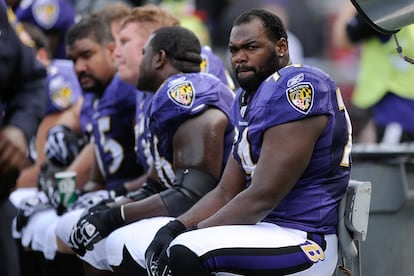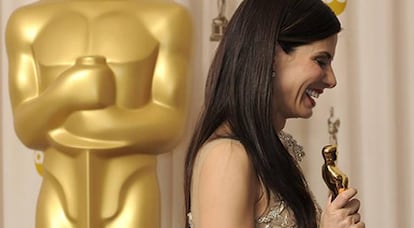Michael Oher, inspiration for Oscar-winning ‘The Blind Side,’ claims his adoption was a lie
The former NFL offensive tackle, who won a Super Bowl with the Baltimore Ravens, has sued after discovering Sean and Leigh Anne Tuohy had him sign conservatorship papers


The Blind Side (2009) highlighted the potential of sport to change lives and its story was one that touched a nerve in a polarized country beset by racial tension. Sandra Bullock won an Oscar for her performance as Leigh Anne Tuohy, who welcomed a Black teenager, who was on the verge of becoming homeless but who went on to play in the NFL as an offensive tackle, into her family. The movie, based on a true story, was a huge commercial success, grossing $300 million in the United States alone. However, on August 14, one of its flesh-and-blood protagonists said that it was all a lie.
Michael Oher, the former NFL player, who is now 37 and retired, filed a petition Monday at the Shelby County Probate Court to end the guardianship of Sean and Leigh Anne Tuohy, who took him into their wealthy, evangelical family 21 years ago, as well as seeking damages for the use of his name and life story, which was originally recounted in a book by celebrated writer Michael Lewis. In the legal document, Oher claims the Tuohys enriched themselves by “publicly and falsely” misrepresenting themselves as his adoptive parents.
Oher’s birth mother had 12 children but suffered from drug addiction and was unable to take care of them. Shortly before his 11th birthday, Oher was sent to an orphanage. He tried his luck in a few foster homes, but there was no chemistry with the families who opened their doors to him. He spent some nights on the streets and attended 11 schools over nine years, where he repeated the first and second grades. However, his physical and athletic ability was soon spotted. The principal of a private, religious school in Memphis gave him an opportunity, and there Oher met the Tuohy’s two biological children. In high school, offers started pouring in for college scholarships. Oher claims it was at this point that the Tuohys began to bond with him, inviting him to stay at their home and asking him to call them “dad” and “mom.”
“The lie of Michael’s adoption is one upon which co-conservators Leigh Anne Tuohy and Sean Tuohy have enriched themselves at the expense of their Ward, the undersigned Mr. Oher,” the 14-page petition states. The document claims he discovered the falsehood “to his chagrin and embarrassment” in February of this year. He then learned that the guardianship he voluntarily agreed to months before his 18th birthday in 2004, with the idea that he would be part of the family, did not actually provide him with any filial relationship with the Tuohys. Oher’s attorneys are also seeking compensation for the former NFL player and sanctions against his alleged adoptive parents.
The petition alleges a deal was reached to pay the Tuohys, plus children Sean Jr. and Collins, $225,000 plus 2.5% of future defined net proceeds hinging on Oher’s signature. A contract titled “Life Story Rights Agreement” was “purportedly signed by Michael Oher” and dated April 20, 2007, according to the petition. The former athlete’s legal representatives claim that no one explained to him the implications of signing such a document. In a 2010 book, Leigh Anne Tuohy claims that the money received for the movie was divided in five equal parts, including the player. Oher’s lawyers claim, however, that he does not receive royalties for the film, which was also nominated for an Oscar for Best Picture in 2010.

Tuohy family “devastated” by Oher’s lawsuit
Sean Tuohy has told local Memphis media that the guardianship was a requirement demanded by the National Collegiate Athletic Association (NCAA). The paperwork would facilitate Oher’s signing with the University of Mississippi Ole Miss Rebels, Sean and Leigh Anne’s alma mater, a customary preliminary step for collegiate players prior to potentially being drafted by the NFL. Tuohy told reporters that he will end the guardianship if that is what Oher wants.
“We’re devastated,” Tuohy told The Daily Memphian newspaper. “It’s upsetting to think we would make money off any of our children. But we’re going to love Michael at 37 just like we loved him at 16.” The family’s lawyers have stated that Sean and Leigh Anne will respond to the court petition in the coming days.
The success of The Blind Side made Leigh Anne an authoritative voice on the issue of adoption in the United States through her nonprofit Making it Happen Foundation. The Tuohy family was represented by the powerful Creative Artists Agency, while Oher was represented by Debra Branan, a family friend who filed the 2004 guardianship agreement. Oher’s relationship with the Tuohys had been fading for several years, largely due to the screen adaptation of his story, which he felt portrayed him as unintelligent. “He’s not a fan of the movie,” one of Oher’s teammates on the Carolina Panthers said in 2015.
The Blind Side generated notoriety Oher had never sought. He spent five seasons with the Baltimore Ravens, winning the Super Bowl in 2013, before moving to the Tennessee Titans, where he signed a four-year contract for $20 million. However, he left after one season to play for the Panthers. “I’m not trying to prove anything. People look at me, and they take things away from me because of a movie. They don’t really see the skills and the kind of player I am. That’s why I get downgraded so much, because of something off the field,” he told ESPN a few years ago.
Sign up for our weekly newsletter to get more English-language news coverage from EL PAÍS USA Edition
Tu suscripción se está usando en otro dispositivo
¿Quieres añadir otro usuario a tu suscripción?
Si continúas leyendo en este dispositivo, no se podrá leer en el otro.
FlechaTu suscripción se está usando en otro dispositivo y solo puedes acceder a EL PAÍS desde un dispositivo a la vez.
Si quieres compartir tu cuenta, cambia tu suscripción a la modalidad Premium, así podrás añadir otro usuario. Cada uno accederá con su propia cuenta de email, lo que os permitirá personalizar vuestra experiencia en EL PAÍS.
¿Tienes una suscripción de empresa? Accede aquí para contratar más cuentas.
En el caso de no saber quién está usando tu cuenta, te recomendamos cambiar tu contraseña aquí.
Si decides continuar compartiendo tu cuenta, este mensaje se mostrará en tu dispositivo y en el de la otra persona que está usando tu cuenta de forma indefinida, afectando a tu experiencia de lectura. Puedes consultar aquí los términos y condiciones de la suscripción digital.








































